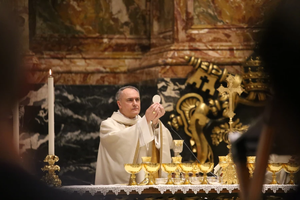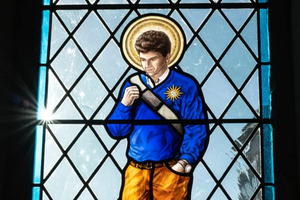What a Song Can Teach Us About Pardon
While it is ‘hard to ask for forgiveness,’ it is what love demands.

“Je vous demande pardon” means “I ask your forgiveness.” It’s the refrain of the song “Pardon” (Forgiveness) sung (in French) by the “Sweet People.” “Sweet People” is a group, originally launched in Switzerland by its lead singer, Alain Morisod, to take part in the 1977 Eurovision song contest. “Sweet People” is a group that sings mellow pop, frequently love songs.
“Pardon” struck me because of its lyrics. Love songs often do not inspire deep thought, but “Pardon” does.
Consider the first lines of the chorus:
It is hard to ask for forgiveness. It is easier to say, “I love you.”
English is, in a real sense, an impoverished language. One word, “love,” is supposed to cover a multitude of things, from expressing preferences about ice cream to the self-sacrificing benevolence of charity. In that sense, Sweet People are right. “I love you” can be cheap. It can be superficial. And it can fail to grapple with anti-love. In all those senses, it can be unconvincing.
But such evasion comes at a price, one that “Pardon” captures. “We take refuge in silence. Nothing is really [ever] over.”
Evasion and circumlocution cannot resolve the impediment that remains unspoken but, like the elephant in the middle of the room, we pretend is not there. As the song notes, it creates “distance.”
But man is made for the good. That’s a good thing, but it can be turned into a bad thing. When we use that orientation to seek the good, it achieves its goal. When we persist in what is not good, that orientation becomes warped: we try to talk ourselves into believing that what is not good is good.
The song picks up that theme:
We play a comedy telling ourselves that ‘this is life’ and everything starts over, like before.
In other words, the rut is never escaped. We pretend to acquire a taste for the bitter, but even feigning it is bittersweet.
The problem is: We know better. Instead, like a slow but real leak, “love escapes slowly.”
The point of “Pardon” is exactly its refrain: While it is “hard to ask for forgiveness,” it is what love demands. And, as the political philosopher J. Budziszewski noted in another context about forgiveness, it’s the only coinage capable of paying the piper. The problem is we try to pay with counterfeits.
There is only one coinage of the forgiveness realm. So, on the one hand, as hard as it is, forgiveness must be sought. But then there is the other side of the coin: forgiveness must be given.
One can stagnate in a refusal to ask forgiveness. But one can also stagnate in a refusal to give it. Either way, as the singers note, “We rip ourselves apart — no, we rather destroy ourselves.”
History is replete with bad — evil — choices for which forgiveness must be asked. But it is also weighed down by a refusal to forgive, as if time can be turned back. Not only can it not be, but its future reservoir is being poisoned by a futile effort to relive the past.
As Advent is little more than two weeks away, it is worth reflecting on the wisdom in this old pop tune. Because — stealing the words of the Marshall Tucker Band — we ‘heard it in a love song’ – and it’s true, even in French.
- Keywords:
- forgiveness
- divine mercy
















